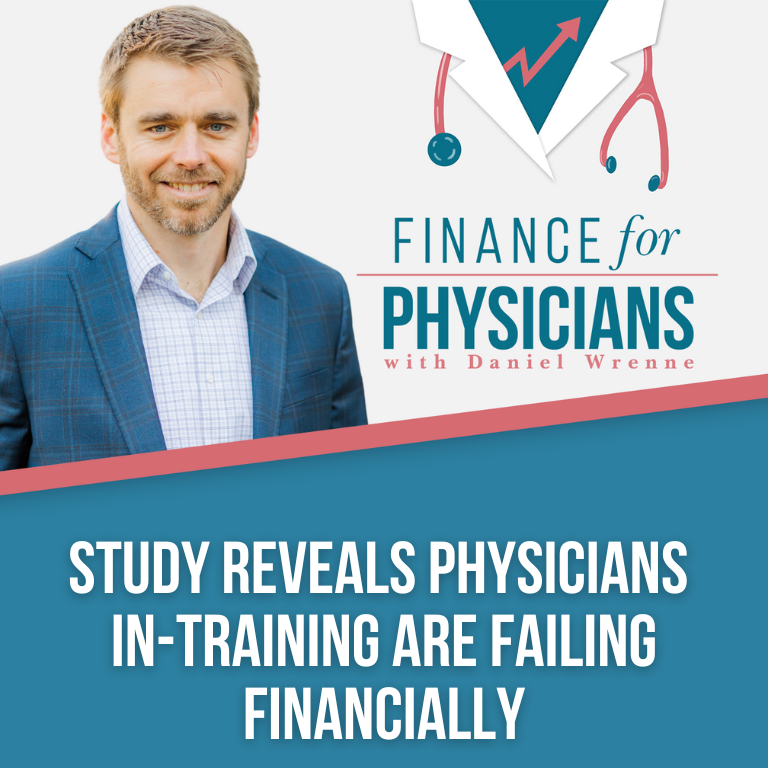Are physicians bad with money? This recent study helps answer the question using data collected from 422 medical residents and fellows at Washington University and the University of Arizona. The participating physicians completed a quiz on basic personal finance knowledge and answered additional questions on financial status, behaviors and professional advice. And the results aren’t pretty.
They scored a big fat F (52%) on the quiz section. Only 65.4% knew Roth IRA’s allowed for tax-free withdrawals in retirement, 19.9% knew bond prices fall when interest rates rise and 16.1% knew why different mutual fund share classes existed (to provide the same investment with a different expense structure).
Their feelings about financial status, behaviors and dealings with professional advisors are equally concerning. They gave themselves a score of 4.8 out of 10 in regards to their satisfaction with their personal finances. Only 14% of residents with children have a will. Of those surveyed, 46.7% or 197 residents and fellows obtained professional financial advice in past 5 years. However the overwhelming majority didn’t actually pay anything for the professional financial advice (maybe they’re getting what they paid for). Insurance and investment advice topped the list of the type advice received. Coincidentally most financial professionals, especially those that don’t charge fees, only get paid when they sell insurance and investment products.
Professional Financial Advice Is Not Working
It’s clear from the study physicians in-training are failing financially. I’m not surprised. After all, when you’re working 80+ hours per week learning medicine, everything else (besides work) takes a back seat. Before we talk about solutions, let’s talk about what’s not working.
As the data suggests, plenty of financial professionals are actively providing free financial advice to help address the problem. But it’s not working because it turns out these financial professionals are really salespeople paid to sell insurance, not give advice. In fact, most financial advisors chasing residents are explicitly required per their employment contract to never actually give financial advice. Why would they call themselves “advisors”? Because anybody can call themselves a financial advisor and it’s easier to sell product as a “professional advisor”.
Financially inexperienced and illiterate physicians in training aren’t qualified to sniff out salespeople vs true advisors. It’s the perfect opportunity for aggressive salespeople to disguise themselves as advice providers offering free “education”. Everyday, financial advisor-salespeople deliver financial lectures to residents and fellows across the country. They gladly offer attendees no-cost financial advice, planning and one-on-one meetings. In fact, they’re going to chase every single attendee until they agree to schedule a one-to-one meeting.
The real damage happens in these one-on-one meetings. Young physicians lacking experience and financial knowledge are at a serious disadvantage when they sit face to face with a highly trained salesperson disguised as a financial advisor. Many don’t understand the danger of conflicts of interest and naively assume people are looking out for their best interest. They need all kinds of financial advice like when to buy disability insurance, what type mortgage to get or how to manage student loans. Why not get it all from the free trusted advisor that’s offering to come to you. I know this process well because I used to be one of these advisors. Eventually I realized how misleading, quit my sales job and started my business.
What’s The Solution?
Quality unbiased financial education is the starting point. The author implies that it’s the medical educators and ACGME’s responsibility to improve in-training physicians financial wellness. He suggests that medical educators should incorporate financial education into curricula. And that it be measured for effectiveness. All great ideas!
The question is who is capable of providing the quality unbiased financial education to medical residents and fellows? It’s certainly not financial advisor-salespeople.
What about the educators themselves? This cuts out most of the conflicts of interest. Money is a tricky topic especially when you consider the behavioral components. These medical educators have no experience delivering financial education and coaching. Plus it’s taking them away from their expertise of teaching medicine. I don’t see this as the ideal solution either.
For this to work, it must be provided by a third party company with expertise and experience delivering objective and actionable finance content to physicians in-training. Conflicts of interest must be avoided by using a company that’s strictly fee-for-service (no commissions or kickbacks) with concentration in financial wellness for physicians. These financial wellness programs should be incorporated into curricula and be paid for by the institution. Incentives similar to health wellness programs could be built in to drive participation. The program would include workshops, tools and other resources tailored to in-training physicians and delivered by the objective experts. The educational campaign should be measured along the way for effectiveness at improving financial literacy and desired outcomes.
